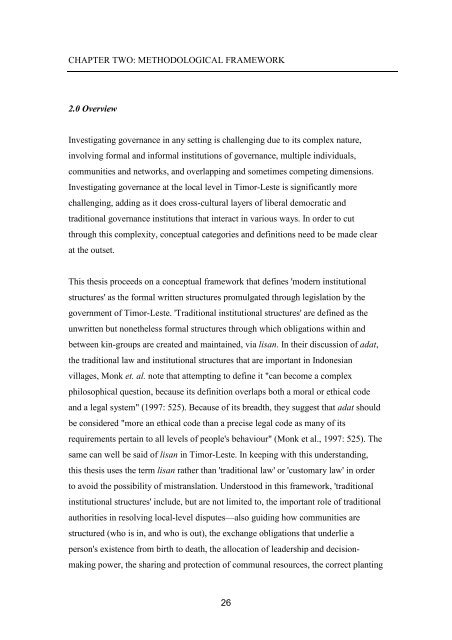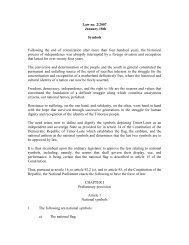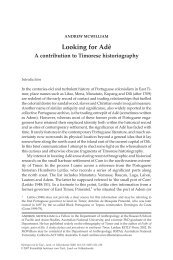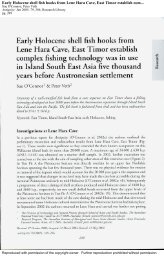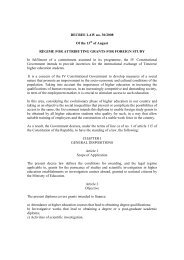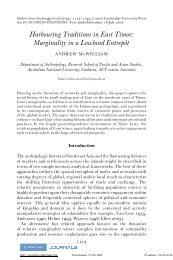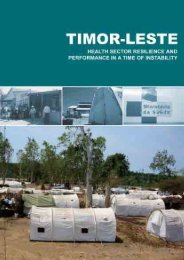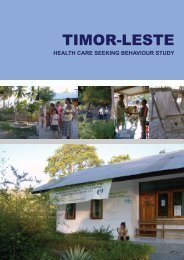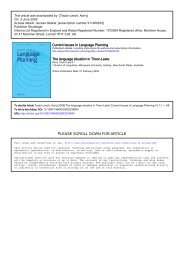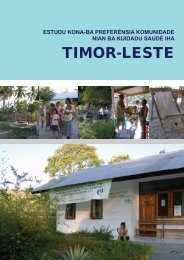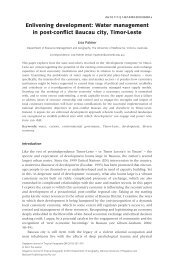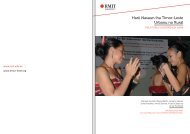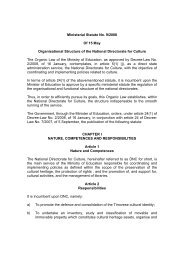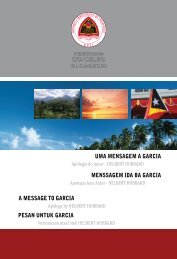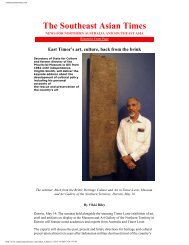Local Governance in Timor-Leste - Secretaria de Estado da Arte e ...
Local Governance in Timor-Leste - Secretaria de Estado da Arte e ...
Local Governance in Timor-Leste - Secretaria de Estado da Arte e ...
- No tags were found...
Create successful ePaper yourself
Turn your PDF publications into a flip-book with our unique Google optimized e-Paper software.
CHAPTER TWO: METHODOLOGICAL FRAMEWORK2.0 OverviewInvestigat<strong>in</strong>g governance <strong>in</strong> any sett<strong>in</strong>g is challeng<strong>in</strong>g due to its complex nature,<strong>in</strong>volv<strong>in</strong>g formal and <strong>in</strong>formal <strong>in</strong>stitutions of governance, multiple <strong>in</strong>dividuals,communities and networks, and overlapp<strong>in</strong>g and sometimes compet<strong>in</strong>g dimensions.Investigat<strong>in</strong>g governance at the local level <strong>in</strong> <strong>Timor</strong>-<strong>Leste</strong> is significantly morechalleng<strong>in</strong>g, add<strong>in</strong>g as it does cross-cultural layers of liberal <strong>de</strong>mocratic andtraditional governance <strong>in</strong>stitutions that <strong>in</strong>teract <strong>in</strong> various ways. In or<strong>de</strong>r to cutthrough this complexity, conceptual categories and <strong>de</strong>f<strong>in</strong>itions need to be ma<strong>de</strong> clearat the outset.This thesis proceeds on a conceptual framework that <strong>de</strong>f<strong>in</strong>es 'mo<strong>de</strong>rn <strong>in</strong>stitutionalstructures' as the formal written structures promulgated through legislation by thegovernment of <strong>Timor</strong>-<strong>Leste</strong>. 'Traditional <strong>in</strong>stitutional structures' are <strong>de</strong>f<strong>in</strong>ed as theunwritten but nonetheless formal structures through which obligations with<strong>in</strong> andbetween k<strong>in</strong>-groups are created and ma<strong>in</strong>ta<strong>in</strong>ed, via lisan. In their discussion of a<strong>da</strong>t,the traditional law and <strong>in</strong>stitutional structures that are important <strong>in</strong> Indonesianvillages, Monk et. al. note that attempt<strong>in</strong>g to <strong>de</strong>f<strong>in</strong>e it "can become a complexphilosophical question, because its <strong>de</strong>f<strong>in</strong>ition overlaps both a moral or ethical co<strong>de</strong>and a legal system" (1997: 525). Because of its breadth, they suggest that a<strong>da</strong>t shouldbe consi<strong>de</strong>red "more an ethical co<strong>de</strong> than a precise legal co<strong>de</strong> as many of itsrequirements perta<strong>in</strong> to all levels of people's behaviour" (Monk et al., 1997: 525). Thesame can well be said of lisan <strong>in</strong> <strong>Timor</strong>-<strong>Leste</strong>. In keep<strong>in</strong>g with this un<strong>de</strong>rstand<strong>in</strong>g,this thesis uses the term lisan rather than 'traditional law' or 'customary law' <strong>in</strong> or<strong>de</strong>rto avoid the possibility of mistranslation. Un<strong>de</strong>rstood <strong>in</strong> this framework, 'traditional<strong>in</strong>stitutional structures' <strong>in</strong>clu<strong>de</strong>, but are not limited to, the important role of traditionalauthorities <strong>in</strong> resolv<strong>in</strong>g local-level disputes—also guid<strong>in</strong>g how communities arestructured (who is <strong>in</strong>, and who is out), the exchange obligations that un<strong>de</strong>rlie aperson's existence from birth to <strong>de</strong>ath, the allocation of lea<strong>de</strong>rship and <strong>de</strong>cisionmak<strong>in</strong>gpower, the shar<strong>in</strong>g and protection of communal resources, the correct plant<strong>in</strong>g26


